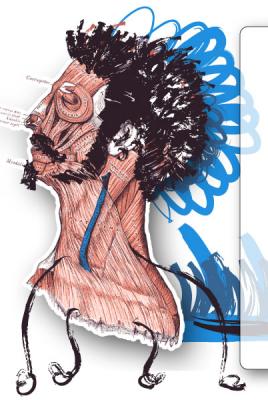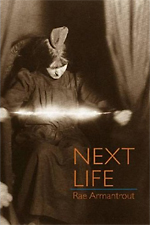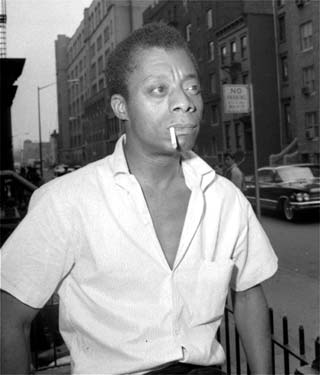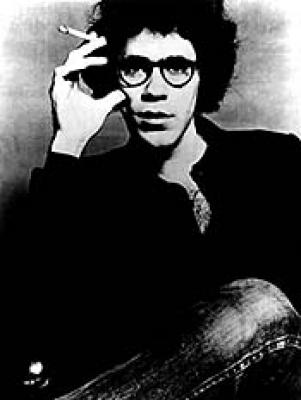An excerpt from James Baldwin’s essay, “If Black English Isn’t a Language, Then Tell Me, What Is?” (1979):
People evolve a language in order to describe and thus control their circumstances, or in order not to be submerged by a reality that they cannot articulate. …
What joins all languages, and all men, is the necessity to confront life, in order, not inconceivably, to outwit death: The price for this is the acceptance, and achievement, of one’s temporal identity. So that, for example, thought it is not taught in the schools (and this has the potential of becoming a political issue) the south of France still clings to its ancient and musical Proven�al, which resists being described as a “dialect.” And much of the tension in the Basque countries, and in Wales, is due to the Basque and Welsh determination not to allow their languages to be destroyed. This determination also feeds the flames in Ireland for many indignities the Irish have been forced to undergo at English hands is the English contempt for their language.
It goes without saying, then, that language is also a political instrument, means, and proof of power. It is the most vivid and crucial key to identify: It reveals the private identity, and connects one with, or divorces one from, the larger, public, or communal identity. There have been, and are, times, and places, when to speak a certain language could be dangerous, even fatal. Or, one may speak the same language, but in such a way that one’s antecedents are revealed, or (one hopes) hidden.
–from James Baldwin’s “If Black English Isn’t a Language, Then Tell Me, What Is?” (1979).
~~
An excerpt from Paule Marshall’s essay, “The Making of a Writer: From the Poets in the Kitchen” (1983):
‘’If you say what’s on your mind in the language that comes to you from your parents and your street and friends you’ll probably say something beautiful.’’ Grace Paley tells this, she says, to her students at the beginning of every writing course. …
I grew up among poets. Now they didn’t look like poets – whatever that breed is supposed to look like. Nothing about them suggested that poetry was their calling. They were just a group of ordinary housewives and mothers, my mother included, who dressed in a way (shapeless housedresses, dowdy felt hats and long, dark, solemn coats) that made it impossible for me to imagine they had ever been young. …
Later, armed with the few dollars they had earned, which in their vocabulary became ‘’a few raw-mouth pennies,’’ they made their way back to our neighborhood, where they would sometimes stop off to have a cup of tea or cocoa together before going home to cook dinner for their husbands and children. …
The basement kitchen of the brownstone house where my family lived was the usual gathering place. Once inside the warm safety of its walls the women threw off the drab coats and hats, seated themselves at the large center table, drank their cups of tea or cocoa, and talked. While my sister and I sat at a smaller table over in a corner doing our homework, they talked – endlessly, passionately, poetically, and with impressive range. No subject was beyond them.
True, they would indulge in the usual gossip: whose husband was running with whom, whose daughter looked slightly ‘’in the way’’ (pregnant) under her bridal gown as she walked down the aisle. That sort of thing. But they also tackled the great issues of the time. They were always, for example, discussing the state of the economy. It was the mid and late 30’s then, and the aftershock of the Depression, with its soup lines and suicides on Wall Street, was still being felt.
Some people, they declared, didn’t know how to deal with adversity. They didn’t know that you had to ‘’tie up your belly’’ (hold in the pain, that is) when things got rough and go on with life. They took their image from the bellyband that is tied around the stomach of a newborn baby to keep the navel pressed in.
They talked politics. Roosevelt was their hero. He had come along and rescued the country with relief and jobs, and in gratitude they christened their sons Franklin and Delano and hoped they would live up to the names. …
THERE was no way for me to understand it at the time, but the talk that filled the kitchen those afternoons was highly functional. It served as therapy, the cheapest kind available to my mother and her friends. Not only did it help them recover from the long wait on the corner that morning and the bargaining over their labor, it restored them to a sense of themselves and reaffirmed their self-worth. Through language they were able to overcome the humiliations of the work-day. …
But more than therapy, that freewheeling, wide-ranging, exuberant talk functioned as an outlet for the tremendous creative energy they possessed. They were women in whom the need for self-expression was strong, and since language was the only vehicle readily available to them they made of it an art form that – in keeping with the African tradition in which art and life are one – was an integral part of their lives.
And their talk was a refuge. They never really ceased being baffled and overwhelmed by America – its vastness, complexity and power. Its strange customs and laws. At a level beyond words they remained fearful and in awe. Their uneasiness and fear were even reflected in their attitude toward the children they had given birth to in this country. They referred to those like myself, the little Brooklynborn Bajans (Barbadians), as ‘’these New York children’’ and complained that they couldn’t discipline us properly because of the laws here. ‘’You can’t beat these children as you would like, you know, because the authorities in this place will dash you in jail for them. After all, these is New York children.’’ Not only were we different, American, we had, as they saw it, escaped their ultimate authority.
Confronted therefore by a world they could not encompass, which even limited their rights as parents, and at the same time finding themselves permanently separated from the world they had known, they took refuge in language. ‘’Language is the only homeland,’’ Czeslaw Milosz, the emigre Polish writer and Nobel Laureate, has said. This is what it became for the women at the kitchen table.
It served another purpose also, I suspect. My mother and her friends were after all the female counterpart of Ralph Ellison’s invisible man. Indeed, you might say they suffered a triple invisibility, being black, female and foreigners. They really didn’t count in American society except as a source of cheap labor. But given the kind of women they were, they couldn’t tolerate the fact of their invisibility, their powerlessness. And they fought back, using the only weapon at their command: the spoken word.
Those late afternoon conversations on a wide range of topics were a way for them to feel they exercised some measure of control over their lives and the events that shaped them. ‘’Soully-gal, talk yuh talk!’’ they were always exhorting each other. ‘’In this man world you got to take yuh mouth and make a gun!’’ They were in control, if only verbally and if only for the two hours or so that they remained in our house.
–from Paule Marshall’s essay, “The Making of a Writer: From the Poets in the Kitchen” (1983).
~~
This entry was posted on Friday, August 24th, 2007 at 7:33 pm
3 Responses to ““Why Poetry?””





















December 9th, 2007 at 4:00 am eI got it. I read it.
The sound and touch are great. It’s beautiful!A leedle revu, all true: http://jimk-eclectics.blogspot.com/2007/12/kissed-into-another-country.html
December 19th, 2007 at 4:41 pm eOh hey, if you still have copies, hook a sister up! xoxo
December 19th, 2007 at 9:01 pm eI got you, lady!
December 19th, 2007 at 10:59 pm eI would love to read the poems if still available. cheers. Indran
December 20th, 2007 at 3:37 pm eIf you send me your snail mail address, I’ll send you a copy!